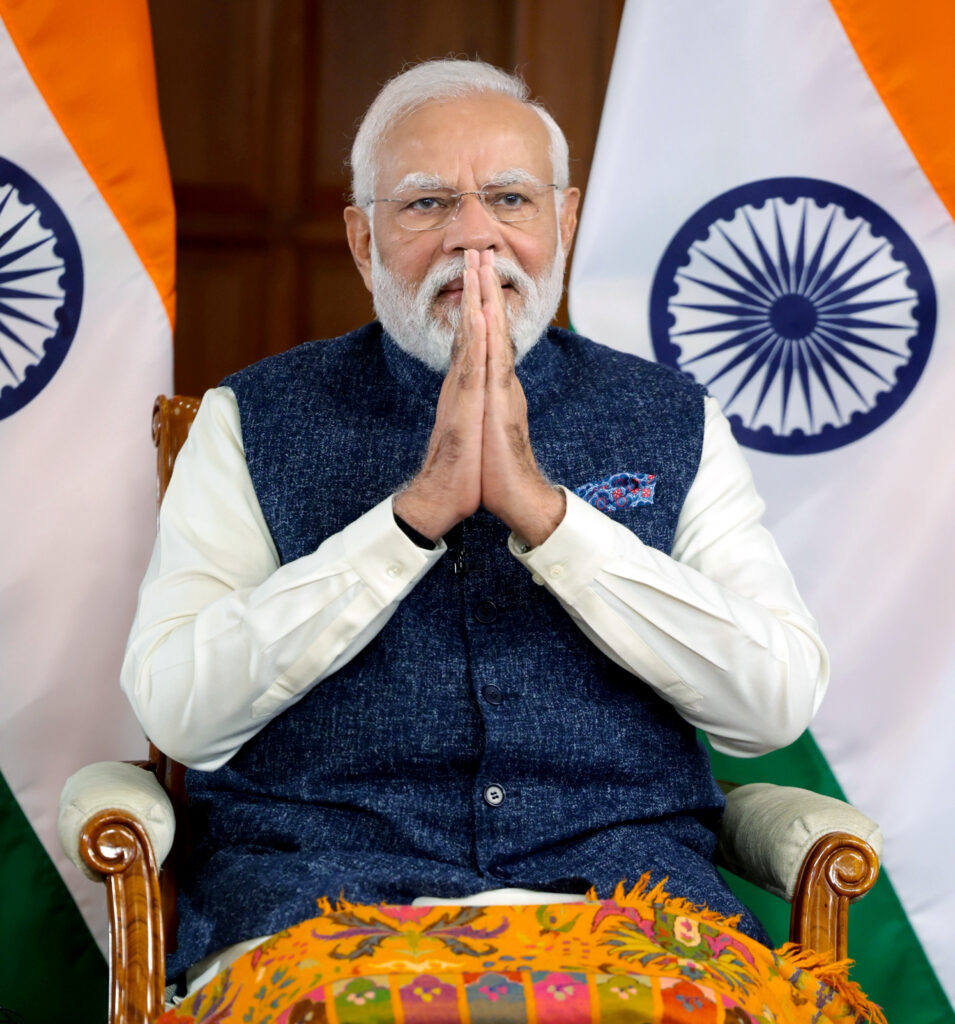Gandhinagar

Prime Minister Narendra Modi on Saturday said India’s GDP growth of 7.7 per cent in the first six months of the current fiscal year is a reflection of the country’s strengthening economy and the transformative reforms carried out in the last 10 years.
Addressing the ‘Infinity Forum 2.0’ conference at the GIFT City here via video link, Modi expressed confidence that in the next few years, India will become the world’s third largest economy, and by 2047 it will become a developed country.
He also said his government wants to turn the Gujarat International Finance Tec (GIFT) City into a global nerve centre of the new age global financial and technology services.
“In the first six months of this financial year, India has achieved a GDP growth of 7.7 per cent…Today, the entire world has pinned its hopes on India, and this did not happen just on its own. This is a reflection of India’s strengthening economy and also the transformative reforms carried out in the last 10 years,” Modi said in his inaugural address.
“These reforms have strengthened the economic foundations of the country. During the pandemic, when most countries were focusing only on fiscal and monetary relief, we focused on long-term growth and expansion of economic capacity,” he said.
In September this year, the International Monetary Fund (IMF) forecast that global growth will be 16 per cent owing to India, he said.
The World Bank also said that there are high expectations from India in the midst of global challenges. The World Economic Forum has said that red-tapism has gone down in India, and the Prime Minister of Australia said India is in a strong position to provide leadership to the global south, he added.
India is one of the fastest-growing fintech markets in the world today and the GIFT International Financial Services Centre (IFSC) is emerging as its centre, the PM said. “We want to make GIFT City the global nerve centre of new age global financial and technology services. I am confident that the products and services of GIFT City will be helpful in solving challenges that the world is facing today,” he said. GIFT City has the capacity to become a gateway to the global fintech world and a fintech laboratory, he said.
Modi said that GIFT IFSC is an efficient channel for the required green capital flow in order to make India a low carbon economy. “The biggest among the challenges that the world faces today is climate change. As one of the world’s largest economies, India is also very conscious of these concerns,” Modi said.
India has made new commitments to the world at the COP summit, and to achieve its target, cost-effective finance will have to be made available, he said. “During G20, our priority was also that everyone understands the need for sustainable finance to global growth and stability. This will promote the transition towards greener, more resilient and inclusive societies and economies,” Modi said.
According to some estimates, for India to achieve its net zero target by 2070, it will need at least USD 10 trillion
“An important focus of our reforms has been to increase our integration with the global economy, by making FDI policy flexible, reducing compliance burden, signing three FTAs, and taking several other important steps in this direction,” he said.
These form a part of the larger reforms we are carrying out to integrate GIFT IFSCA and Indian financial markets with global financial markets, he said. “GIFT City has been envisaged as a dynamic ecosystem that will redefine the international finance landscape. It will establish new benchmarks of innovations, efficiency and global collaboration. The establishment of the IFSCA as a unified regulator in 2020 is an important landmark in this journey,” he said.
Even during the difficult time of economic turmoil due to the COVID-19 pandemic, the IFSCA formulated 27 regulations and created over 10 frameworks, opening up even more avenues for investment, the PM added.
Within a few years of its establishment, the IFSCA has become a prominent gateway for global capital flow, he said. “In IFSC today, there are 580 operational entities, three exchanges including the international bullion exchange, 25 banks including nine foreign banks, 29 insurance entities, two foreign universities, and 50-plus professional service providers,” he said.
“I am confident that in the next few years, GIFT City will be among the best international financial centres,” he said. Describing India as a country with deep democratic values and historic contributions to trade and commerce, he said, “India offers most diverse range of opportunities for every investor and every company. Our vision for GIFT City is a part of India’s growth story.”
India has strong IT talent, its data protection laws and GIFT data initiative give all countries and businesses the secure facility of digital connectivity, he said. “Thanks to India’s youth’s talent, we have become the base for global capability centres for all big companies,” he said.
In the next few years India will become the world’s third largest economy, and by 2047 it will become a developed country, Modi said.
“New forms of capital, digital technologies, and new-age financial services will play an important role in this journey,” he said. Thanks to India’s efficient regulations, plug and play infrastructure, access to the large Indian hinterland economy, beneficial cost of operation and talent advantage, GIFT City is getting set to provide opportunities that will be unparalleled, he said. On the occasion, PM Modi congratulated the people of Gujarat over inclusion of the state’s traditional Garba dance in the UNESCO’s ‘Representative List of the Intangible Cultural Heritage of Humanity’.

